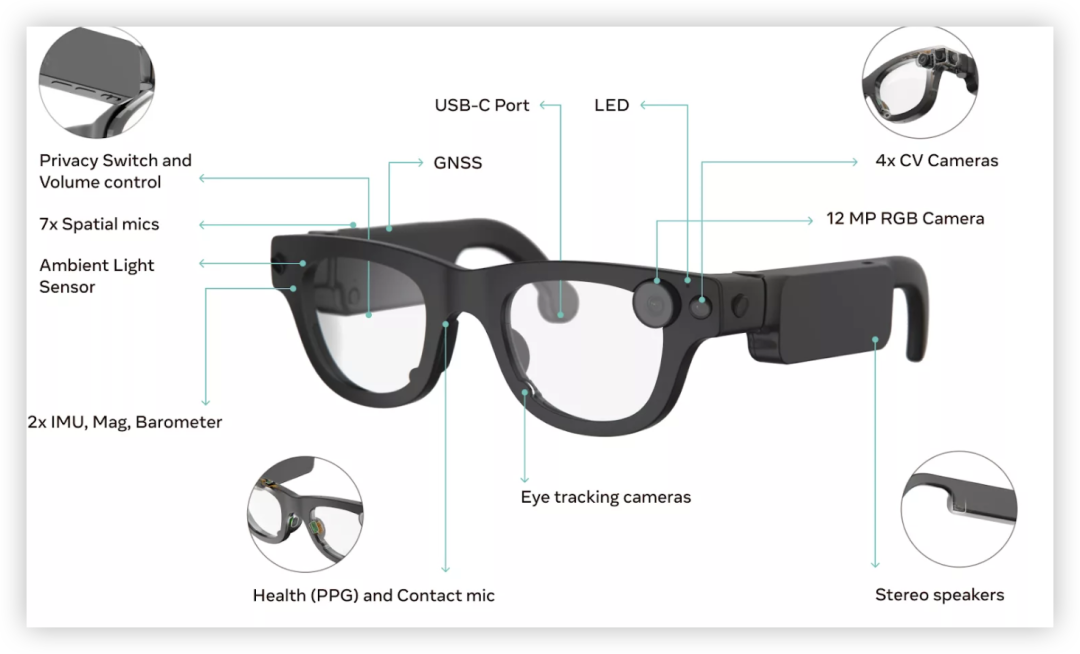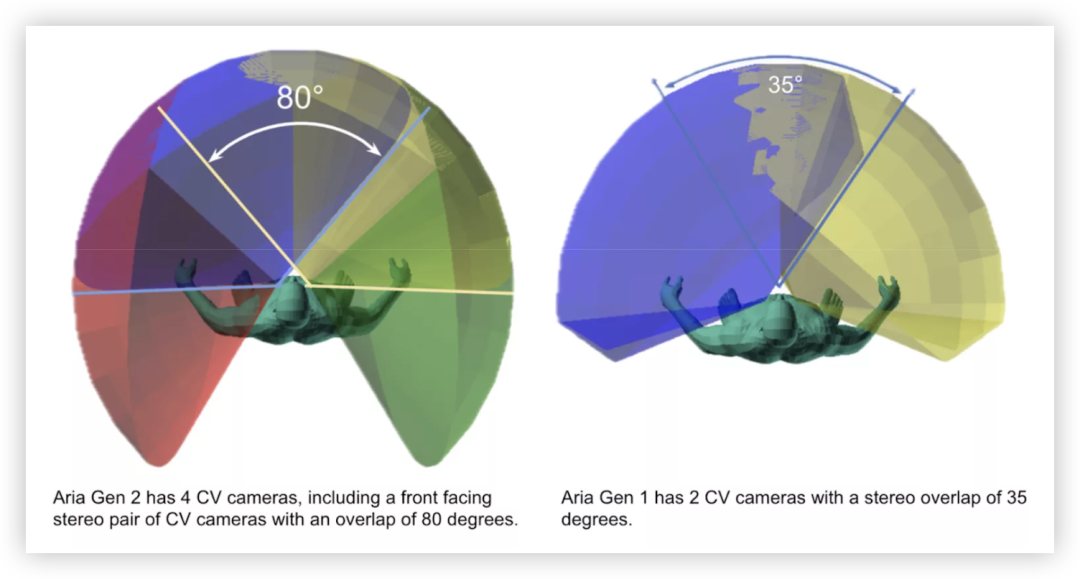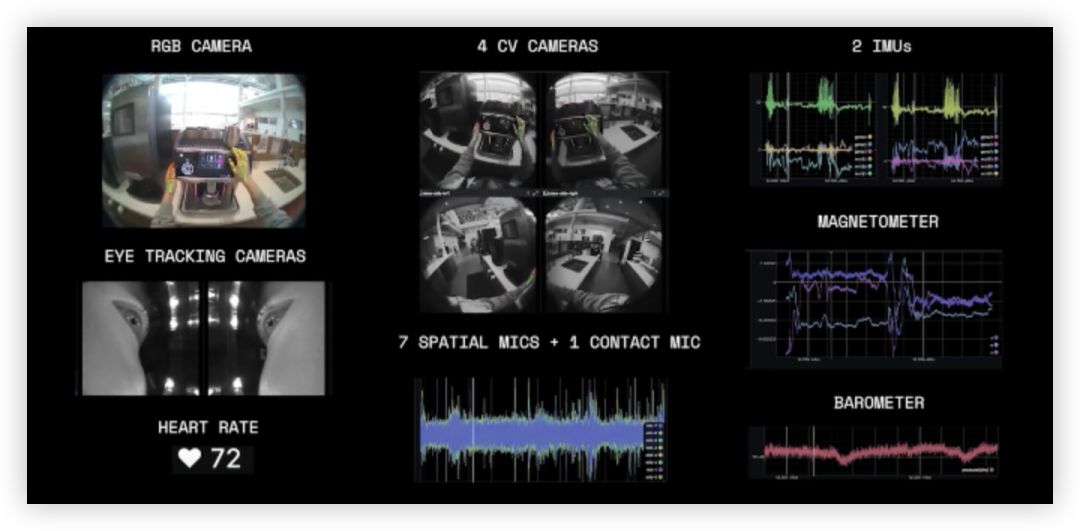Meta Unveils Aria Gen 2 AR Glasses Key Technologies: Deep Dive into the 'Right Posture' for Future Human-Computer Interaction!

Tech enthusiasts, Meta has once again "flexed its muscles" by releasing the Aria Gen 2 AR glasses. These aren't for "binge-watching" or "gaming" - they're Meta's secret weapon specifically crafted for AI research. So, what "black tech" does Aria Gen 2 have? How will it impact the future of AR technology? Recently, Meta has publicly revealed the key technologies of Aria Gen 2 AR glasses, so let's take a deep dive!
Aria Gen 2: The "Super Platform" for AI Research
Aria Gen 2 is not a consumer product but a high-performance research platform carefully crafted by Meta. It's part of a research and development project launched by Meta in September 2020. Its goal is simple: to provide AI developers with powerful tools and rich data to help them develop more practical and intelligent AR applications.
Notably, Aria Gen 2 is a non-commercial research device, different from the commercially available "Ray-Ban Meta" smart glasses and the "Orion" AR glasses under development.
Comfort: From "Stiff" to "Soft"
The wearing experience of the previous generation Aria was, to put it mildly, "challenging." This time, Meta has really put in the effort to improve comfort. Through optimized design and multiple size options, Aria Gen 2 aims to help every researcher "find their fit," maintaining comfort even during extended wear. The foldable design makes it "light as a feather" and easy to carry. It supports various face shapes with 8 size options, adjustable for head width and nose shape. While maintaining a lightweight design, it achieves storage and portability through a foldable bracket.

Camera System: Expanding the "Field of Vision"
Aria Gen 2 is equipped with multiple cameras, like giving your eyes "wide-angle lenses," providing a broader field of view and more precise 3D environment reconstruction. Global shutter cameras and HDR support ensure clear images under various lighting conditions. Simply put, it helps AI algorithms see more clearly, "observing in all directions."

Sensors: Building a "Comprehensive" Data Collection System
Beyond more powerful "eyes," Aria Gen 2 also integrates various sensors, like a "mobile health center," capable of collecting data on heart rate, posture, ambient lighting, and more. This data works in conjunction with visual information to provide AI algorithms with more comprehensive information, helping them better understand human behavior and the surrounding environment.

High-Precision Time Synchronization: Keeping Data "In Step"
In multi-device collaborative research, data synchronization is crucial. Aria Gen 2 uses Sub-GHz wireless technology to achieve sub-millisecond time synchronization accuracy, ensuring that data collected by various devices is "well-organized," providing a reliable foundation for AI algorithm training and validation.
AI Algorithm: Giving Devices the Ability to "Think"
Additionally, Aria Gen 2 is equipped with advanced mechanical recognition algorithms running on Meta's self-developed low-power custom coprocessor.

"Mechanical recognition" refers to the technology of obtaining information through cameras and sensors, processing it in real-time, to precisely understand "the state of people and their surroundings" and "how they move." Through this technology, the device can very precisely capture user movements and interactions with the surrounding environment.
The mechanical recognition algorithm is supported by features like "Visual-Inertial Odometry (VIO)," "eye tracking," and "gesture tracking."

Furthermore, an interactive demonstration of Aria Gen 2 is expected to be showcased at the international computer vision conference "CVPR 2025" in June 2025.
Conclusion: The Road Ahead is Long
Meta's Aria Gen 2 AR glasses represent the cutting edge of current AR technology, demonstrating Meta's determination in building future human-computer interaction platforms. Although it still faces many challenges, we have reason to believe that as technology continues to advance, AR technology will eventually enter our lives and change our world.
分享文章
3篇相关文章
Meta Teams Up with Oakley: Are Smart Sports Glasses Coming?
2025-06-17
Hey tech enthusiasts and sports lovers, has the tech world been a bit restless lately? That's right, Meta is about to make some big news! They're not just playing with the metaverse anymore - they're directly targeting our eyes - Meta has officially announced a partnership with the sports veteran Oakley to launch smart sports glasses!
Meta Launches Next-Gen AR Glasses Aria Gen 2: A New Starting Point for Future Interaction!
2025-06-05
If you've ever dreamed of a pair of glasses that could read your mind and complete various tasks at your command, then Meta's recently launched AR glasses Aria Gen 2 might be the initial realization of this vision. From the first generation to now, AR technology seems to have finally found a direction closer to everyday life. This release of Aria Gen 2 is not just a hardware upgrade, but more like a profound dialogue between technology and humanity.
Trace Creates the 'Canva of AR': No-Code Platform Disrupts Immersive Content Creation!
2025-11-10
Trace launches a no-code AR platform, making augmented reality content creation as simple as creating a PPT. It aims to become the Canva of AR, leading new trends in immersive experiences.